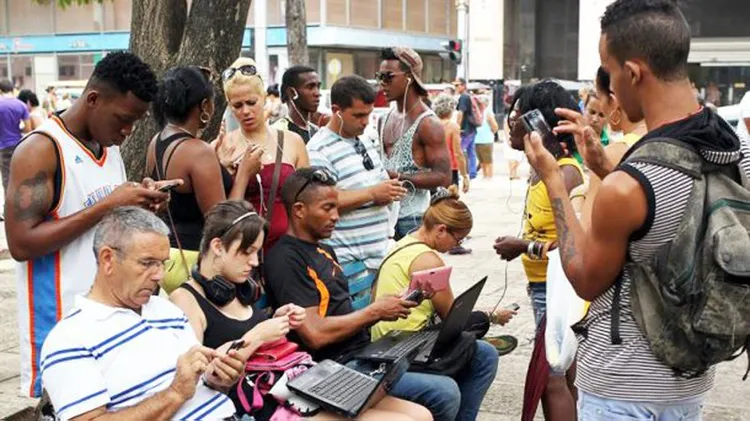Very expensive, slow and censored by the government: six months after the arrival of the internet to mobile phones in Cuba, its inhabitants do not hide their frustration, in a country that remains one of the least connected in the world.
Under the hashtag #BajenLosPreciosDeInternet, several hundred Cubans recently launched a campaign on Twitter to demand rates within their pockets.
"We are hungry, hunger for information, hunger to navigate, hunger for knowledge and intellectual freedom," wrote a cybernaut, while another highlighted with indignation: "It is not possible that the Internet is a luxury in the XXI century."
And "our only telecommunications company spy and censure us with impunity," added a third.
Gone is the euphoria of December 6, 2018, the day that Cuba became one of the last countries on the planet to activate the internet on cell phones.
The public operator Etecsa reported at the end of April that, of the 4.5 million existing mobile lines, "more than 2.3 million can access the internet", without specifying the real number of those who have this service, still inaccessible to the majority of Cubans.
- Blocked sites -
Mobile data packages range from $ 7 for 600 megabytes to $ 30 for 4 gigs in a country where the average salary of public employees -the great majority of the active population- is $ 30 per month.
The same happens with the fixed internet connection, to which only 79,000 Cuban homes are connected, despite the fact that the country has a population of 11.2 million inhabitants.
"If you want to connect to the Internet from home 24 hours a day, 7 days a week (...), you must pay the equivalent of 800 dollars a month", because "there is no flat fee for this service, as the there is in the rest of the world ", explains Norges Rodríguez, coordinator of the blog Yucabyte.org, dedicated to new technologies.
"The purchasing power of Cubans is one of the lowest in the hemisphere, the minimum wage is also at the bottom of the list and Internet access is not among the cheapest," laments the blogger.
And the recent permission to import routers and for the creation of private Wi-Fi networks (using Etecsa's wireless signal) is considered by many as false good news, because to benefit from it you have to pay the dollar an hour.
Rodriguez points out that the Internet connection to which his compatriots have access is limited: on the one hand, "the (Cuban) government blocks websites, especially from the press, where content is published that the government dislikes."
On the other, he adds, "due to the economic sanctions of the United States (which keeps the island under embargo since 1962), some websites are also blocked," as well as some "Apple, Google, Amazon services."
- No return -
One day in February of last year, Abraham Jimenez discovered that his online magazine was blocked.
"They started writing me readers, and they told me they could not access it, and then I could not access it either, we tried to see if it was a problem with the server," Jiménez said.
Six months later, the magazine, which offers an independent view of Cuban affairs, remains inaccessible, without Jimenez receiving an official explanation until now.
According to him, the reticence of the government responds to the impact of the expansion of the internet, especially after the arrival of 3G, which brought a new wind to the socialist island.
"That has generated a different discourse in the social networks," with an effect on real life: Cubans have already organized a demonstration through the Internet "against the mistreatment of animals, an independent march for the rights of the community LGBT ", mobilizations previously unthinkable, illustrates Jiménez.
"And that's what the government is afraid of," he says.
With him agrees Larry Press, professor of the University of Texas and author of a blog about Cuba.
Press recalls that in 1996, when the use of the Internet was beginning to spread, the country, thanks to its "network experience inherited from the Soviet Union", very soon had its first connection "subsidized by the United States", precisely by the National Foundation for Science.
But the prospect of large-scale development frightened its authorities, who feared social unrest and a political change similar to Perestroika.
Then, "they decided not to continue." "Today, I think that (fear) is still in your mind."
However, once 3G is installed, "they can not go back," says Jiménez.